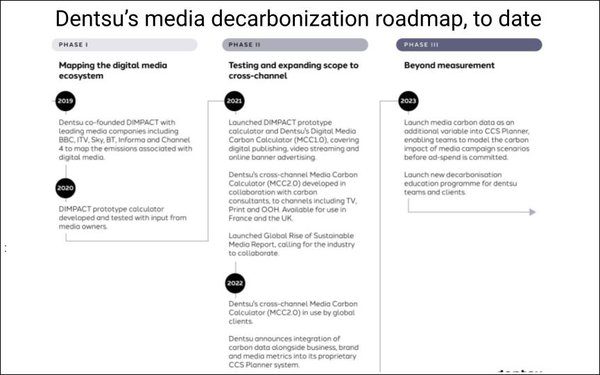Dentsu International this morning released plans for the next phases of its ongoing campaign to help decarbonize the media supply chain by 46% by 2030.
Beginning early next year, Dentsu said, it will begin to integrate carbon emissions data directly into its proprietary media-planning system — “CSS Planner” — which is utilized by all of Dentsu’s media-planning and media-buying teams worldwide.
“This will ensure, for the first time ever, brands can set clear carbon targets for campaigns and model alternative scenarios for optimal impact, reach and carbon levels, long before any third-party investment is made, or resources committed,” the holding company unit said in a statement.
The data will enable Dentsu and its clients to analyze the carbon emissions impact of media buys “at an impression level,” allowing agency and client teams to factor carbon impact into various campaign objectives alongside things like reach, consideration, purchase intent for a “full channel mix.”
“With around $740 billion being spent on advertising per annum, media can be a material and significant emission source for brands, so we have the responsibility to be the major catalyst needed for reducing carbon across the media supply chain,” Global CEO of Media and Global Clients Peter Huijboom states, noting: “Measurement is a good and necessary first step, and we’ve already seen the value this brings to our clients; however, our new carbon planning capabilities will totally transform how dentsu teams work with brands to meet their sustainability, carbon and Scope 3 targets.”
Dentsu International this morning released plans for the next phases of its ongoing campaign to help decarbonize the media supply chain by 46% by 2030.
Beginning early next year, Dentsu said, it will begin to integrate carbon emissions data directly into its proprietary media-planning system — “CSS Planner” — which is utilized by all of Dentsu’s media-planning and media-buying teams worldwide.
“This will ensure, for the first time ever, brands can set clear carbon targets for campaigns and model alternative scenarios for optimal impact, reach and carbon levels, long before any third-party investment is made, or resources committed,” the holding company unit said in a statement.
The data will enable Dentsu and its clients to analyze the carbon emissions impact of media buys “at an impression level,” allowing agency and client teams to factor carbon impact into various campaign objectives alongside things like reach, consideration, purchase intent for a “full channel mix.”
“With around $740 billion being spent on advertising per annum, media can be a material and significant emission source for brands, so we have the responsibility to be the major catalyst needed for reducing carbon across the media supply chain,” Global CEO of Media and Global Clients Peter Huijboom states, noting: “Measurement is a good and necessary first step, and we’ve already seen the value this brings to our clients; however, our new carbon planning capabilities will totally transform how dentsu teams work with brands to meet their sustainability, carbon and Scope 3 targets.”













































